Devon Rex
Felis catus
Advertisement
Devon Rex Scientific Classification
- Kingdom
- Animalia
- Phylum
- Chordata
- Class
- Mammalia
- Order
- Carnivora
- Family
- Felidae
- Genus
- Felis
- Scientific Name
- Felis catus
Read our Complete Guide to Classification of Animals.
Devon Rex Conservation Status
Devon Rex Facts
- Common Name
- Devon Rex
View all of the Devon Rex images!
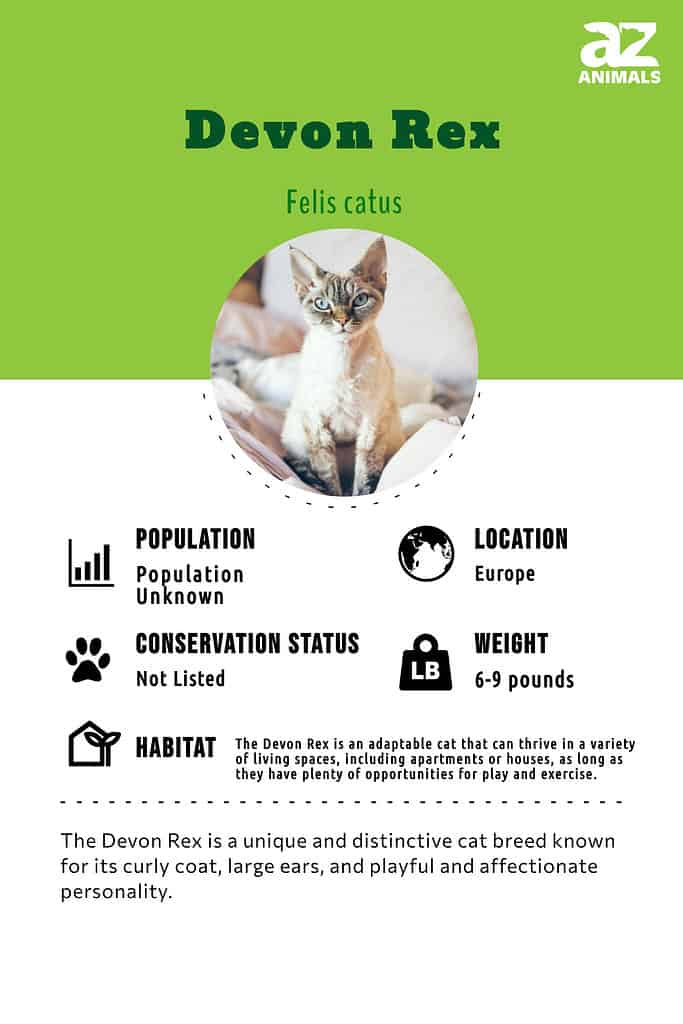
The Devon Rex, which first arose from the town of Devon, England in the 1950s, has attracted a small but devoted following for its livewire personality and its distinctive appearance.
Sporting a slender elf-like face and big ears that don’t seem to entirely fit, this cat is known for its intelligent mind and people-oriented behavioral skills.
See all of our expert product reviews.
It easily ranks among the most outgoing, outlandish, and entertaining of all cat breeds.
There are many interesting facts to explore about this breed.
Devon Rex vs. Cornish Rex
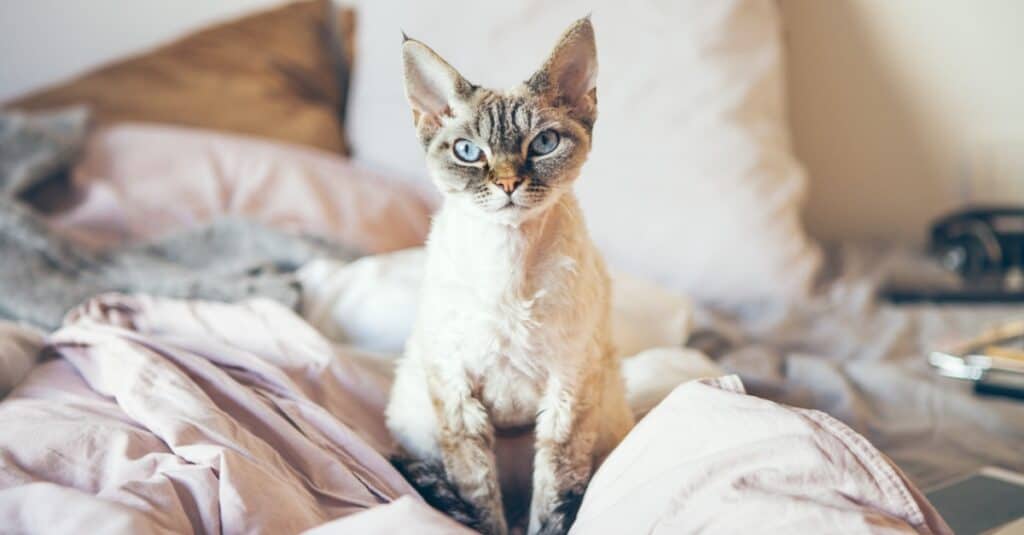
The Devon Rex is a small to medium-sized cat breed known for its unique curly coat, large ears, and playful and affectionate personality.
©iStock.com/insonnia
The Cornish Rex is another unusual-looking short-haired breed that, as the name suggests, originated from the English region of Cornwall.
Health and Entertainment for your Devon Rex
See all of our expert product reviews.
This breed is easy to accidentally mistake for the Devon Rex. It has a very similar impish appearance with big, outsized ears and a curly undercoat.
However, according to genetic analysis, they’re not as closely related to each other as once thought. While the coats are superficially similar, their underlying genetics are quite different. This suggests they arose in different ways.
Evolution and Origins
The Devon Rex breed is thought to have emerged from a random genetic mutation, with the first known curly-haired kitten named Kirlee being born amongst a litter of straight-haired kittens to a stray calico in Devon, England in 1960, and it gained recognition as a breed about ten years after the Cornish Rex breed.
The Devon Rex is frequently likened to a combination of a feline, canine, and primate due to its unique characteristics.
The Devon Rex is a medium-sized cat, typically weighing between 6 to 9 pounds and standing 10 to 12 inches tall, with an unusual, almost otherworldly look that is characterized by its prominent features such as large ears, big eyes, high cheekbones, long neck, and a slender body, in addition to its curly coat.
Furthermore, while generally healthy, the Devon Rex breed may be prone to certain health issues such as hypertrophic cardiomyopathy, patellar luxation, hereditary myopathy, and baldness, particularly if you are not cautious about the source of purchase.
Devon Rex Traits: What to Know Before You Buy
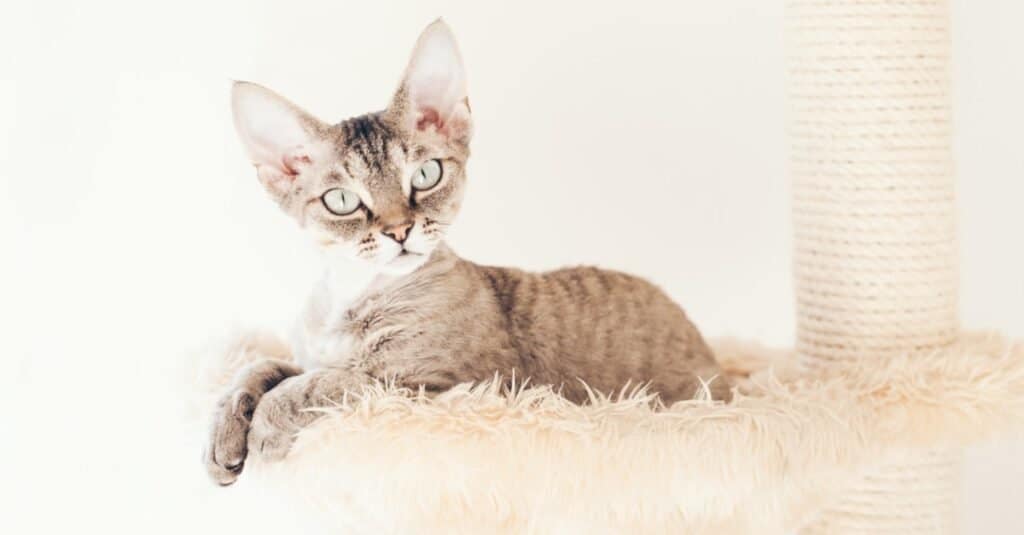
The Devon Rex has tabby-like markings on its coat.
©iStock.com/insonnia
- One of the most distinctive facts about the Devon Rex is its sheer amount of energy. Owners should expect to spend more time than your typical cat breed attending to its physical, mental, and social needs. Toys, cat treats, tricks, and games are all recommended.
- Because the Devon Rex has a relatively thin outer coat, owners will only need to spend perhaps once every few days grooming. However, the coat does tend to become greasy easily, so it does require regular baths with mild shampoo and warm water. The coats are not completely hypoallergenic but should cause a few issues.
- The Devon Rex has a tendency to suffer from several serious health problems, including dislocated joints, hereditary myopathy (body-wide muscle weakness), and hypertrophic cardiomyopathy (which affects the heart muscles specifically).
Personality
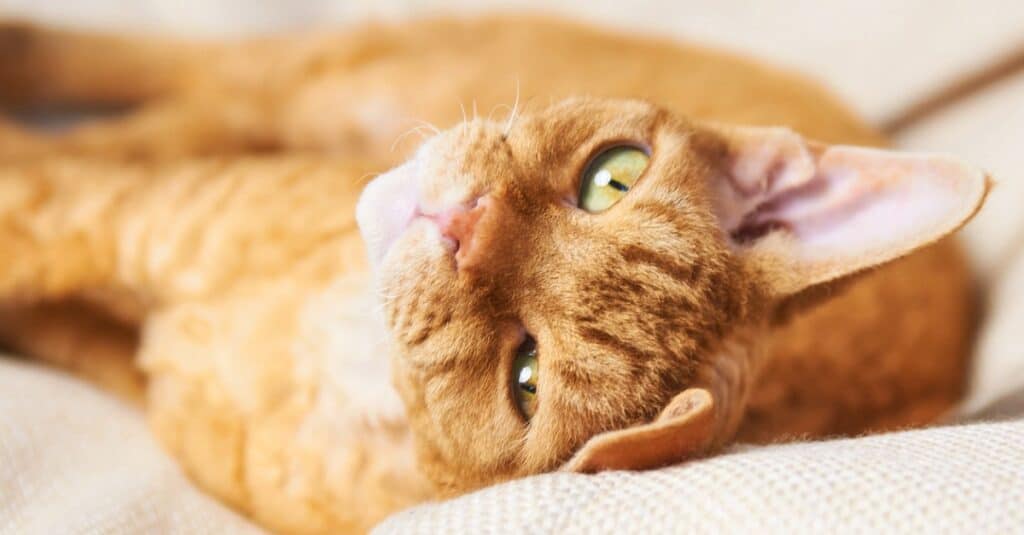
The Devon Rex’s most distinctive feature is its ears
©iStock.com/Dzianis Pilinevich
The Devon Rex is often described as a cross between a cat, a dog, and a monkey. Extremely playful, active, and mischievous, they are very eager to explore their surroundings and interact with almost everything. With their high intellects, they can be taught to play fetch, walk on a leash, and even perform impressive tricks.
Owners will enjoy interacting with this breed because they have a great affinity for people of all ages. They may try to get your attention by bringing you a toy or attempting to initiate playtime.
Whether you’re home or away, you should provide your cat with plenty of toys and other objects to interact with. This is not the type of cat you can leave alone for hours without anything to do.
Size and Weight
The Devon Rex is a medium-sized cat, weighing about six to nine pounds and standing about 10 to 12 inches tall. They look quite slender and lanky as if their bodies are made from mismatched parts, but this is just a natural part of their normal appearance. It may take 18 months or more for the breed to mature and reach its full size.
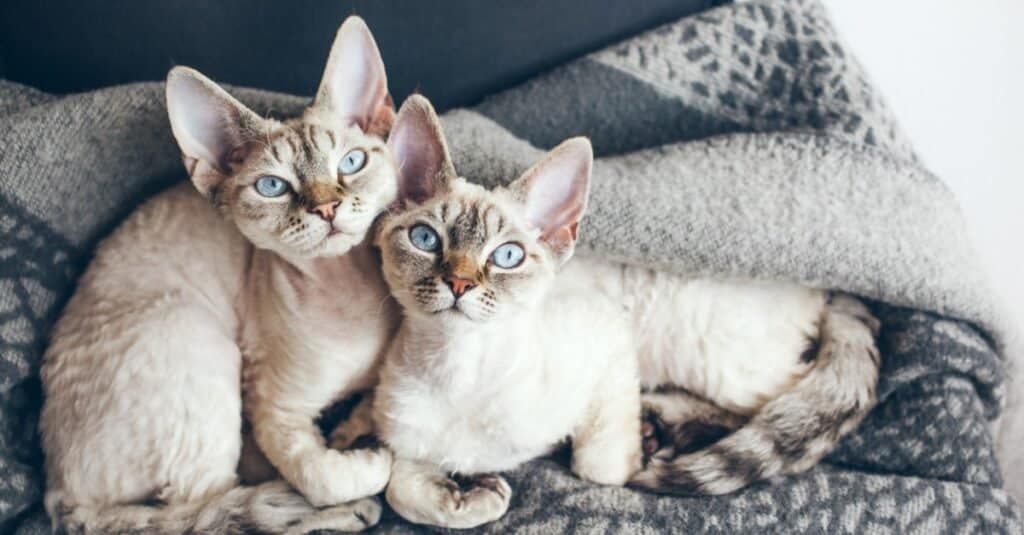
©iStock.com/insonnia
Price
Since this is a relatively uncommon breed, prospective owners can expect to pay somewhere in the range of $600 to $2,000, perhaps even more; the upper range is mostly reserved for well-bred show cats with excellent pedigrees.
A typical household cat from a trusted breeder will probably cost more than $1,000. Keep in mind the additional cost of food, toys, litter, healthcare, etc. You should expect to set aside anywhere between $50 and $200 a month, depending on how much care it needs.
Kittens
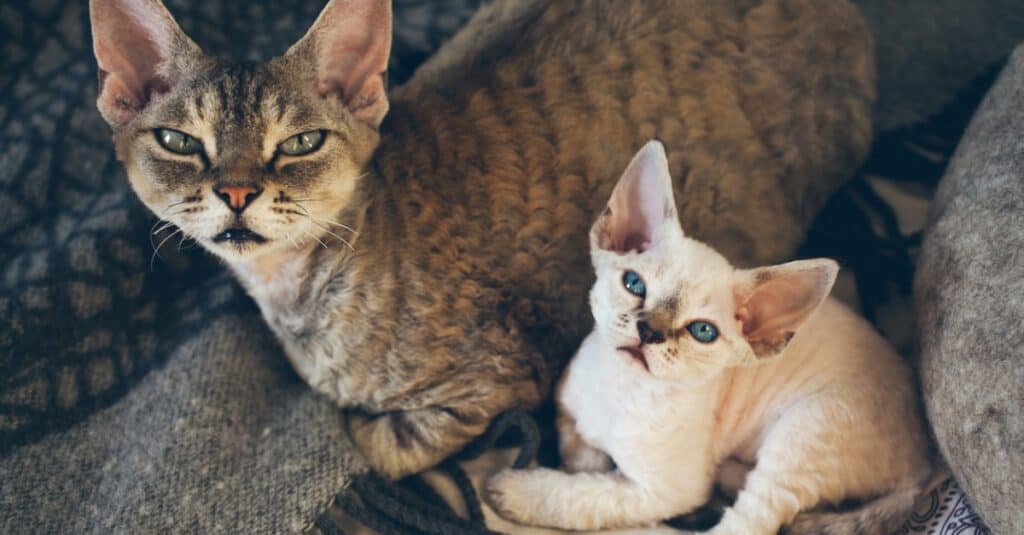
©iStock.com/insonnia
Devon Rex kittens get along very well with all kinds of people and pets alike. While they still need to be socialized from an early age and do require a period of adjustment, this process should be quick and easy.
Positive encounters with different people and situations can help teach proper adult behavior. Keep in mind that the Devon Rex will retain its kitten-like energy until old age. This is part of its natural personality and not a sign of bad behavior. This breed is also sometimes born with excessive hair which it slowly loses during its early development.
Lifespan
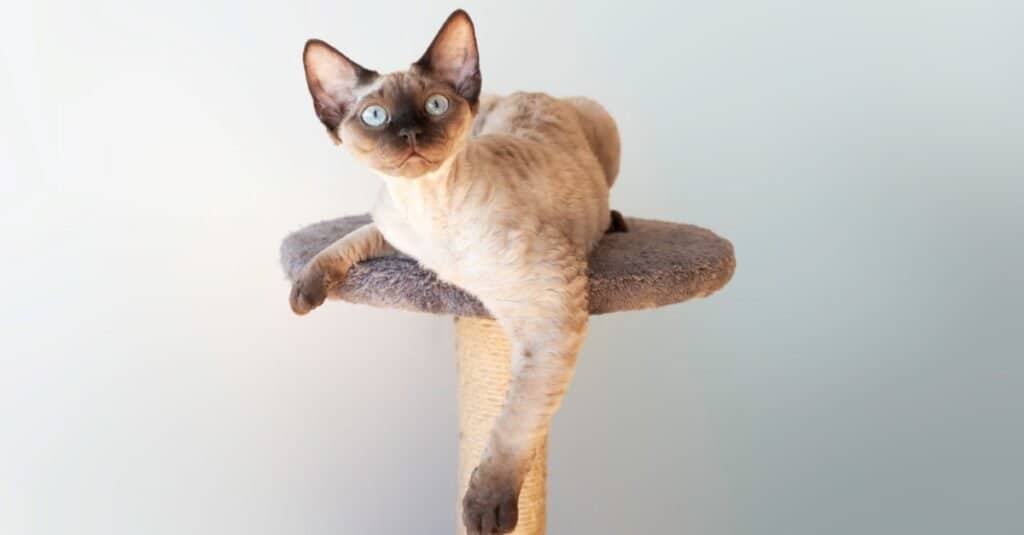
The Devon Rex is capable of learning difficult tricks but can be hard to motivate.
©Veera/Shutterstock.com
The Devon Rex has an excellent average lifespan of nine to 15 years. It is possible, with a bit of luck and good health, for this breed to live around 20 years old.
One of the oldest cats to ever live was a part Devon Rex cat named Granpa Rexs Allen who lived to 34 years of age. Some of the most serious health issues include muscle weakness, heart disease, cancer, and a constantly dislocating joint, which can lead to lameness and pain.
It is always a good idea to purchase your kittens from a responsible breeder who tests their stock for known health problems. If they can’t provide proof that their cats have received a clean bill of health, then you might want to look elsewhere.
Breed vs. Mixed
Like any purebred cat, the Devon Rex is carefully bred to ensure it retains an accepted list of traits, including the slender body, the large ears, the short whiskers, and the short, wavy coat. Unlike many other breeds, however, the Devon Rex has few guard hairs (meaning the coarse hairs of the outer coat). This gives it a soft, full-bodied appearance.
The coat is particularly short on the back, sides, upper legs, and tail. If your cat deviates from some of these traits, then it could be a mix or even a poorly bred cat.
Disqualifying traits include excessive baldness, a long or shaggy coat, a kinked tail, crossed eyes, and weak hind legs. Coat color isn’t always a good guide to purebred status, because it can vary dramatically from bright orange to deep black.
The most common personality traits include high intelligence, friendliness, hyperactivity, and playfulness. However, keep in mind that individual personality traits will always vary a little.
Types of Devon Rex Cats and Colors
The Devon Rex can come in almost any available coat (and even eye) color, including black, chocolate, cinnamon, blue, brown, tan, orange, red, lilac, and white. Possible patterns include tortoiseshell (tortie for short), calico, pointed, and tabby.
Because of its short coat, the Devon Rex shouldn’t require too much grooming. It sheds only a minimal amount. While it’s not completely hypoallergenic, some allergy sufferers might not experience any reaction to this breed.
View all 110 animals that start with DDevon Rex FAQs (Frequently Asked Questions)
How much is a Devon Rex cat?
The price of the Devon Rex from a responsible breeder is normally between $600 and $2,000. If this is currently out of your price range, then you might want to consider adoption. The cost of giving a needy cat a good, loving home is usually no more than a few hundred dollars. For more information about this breed, including a list of potential rescues, you might want to contact the Devon Rex Breed Club or the Rex Cat Club. You might also have some luck with local adoption organizations in your area, but this is an uncommon breed and might be difficult to find. Gather all the available facts before purchasing a kitten.
How long do Devon Rex cats live?
The Devon Rex has a lifespan of nine to 15 years, but it’s not uncommon for some cats to exceed this expectation and live several years longer.
What is a tortie Devon Rex?
Tortie is simply the nickname for a tortoiseshell fur pattern. The fur tends to have a mottled, tortoise-like appearance. Various lighter and darker colors are contrasted in random patterns throughout the entire fur. There are all kinds of different types of tortoiseshell patterns, so it’s possible to choose one that really appeals to you.
Are Devon Rex cats friendly?
Yes, the Devon Rex is among the friendliest and most affectionate cat breeds you can find. They are extremely responsive to people and can be taught to perform various tricks and commands.
Are Devon Rex cats aggressive?
If properly treated and handled, this breed should show very few signs of aggression. They are very chill and relaxed cats.
Are Devon Rex cats healthy?
The Devon is generally quite healthy. As long as you have chosen a good breeder, it should have minimal hereditary conditions.
Are Devon Rex cats good pets?
The Devon Rex can be an excellent companion if you’re willing to put up with its hyperactive personality. Not a whole lot of grooming is required.
Are Devon Rex cats affectionate?
Yes, this breed likes to spend a lot of time with its owner. Its affection is more playful and active than you typical cat breed, however. Expect it to follow you from room to room like a Velcro cat and involve itself in your activities. It also likes to show affection by climbing up around your head or neck area.
What are the differences between Devon Rex and Sphynx?
The key differences between Devon Rex and Sphynx are size, coat type, appearance, and behavior.
What are the differences between Devon Rex and Cornish Rex?
Both are famous for their playful nature as well as their super-soft coats. However, despite the similarities, there are actually a few differences between the Devon Rex and the Cornish Rex – particularly the shape of their faces and ears.
Thank you for reading! Have some feedback for us? Contact the AZ Animals editorial team.
Sources
- The Cat Fanciers' Association , Available here: https://cfa.org/devon-rex/
- DailyPaws, Available here: https://www.dailypaws.com/cats-kittens/cat-breeds/devon-rex

















